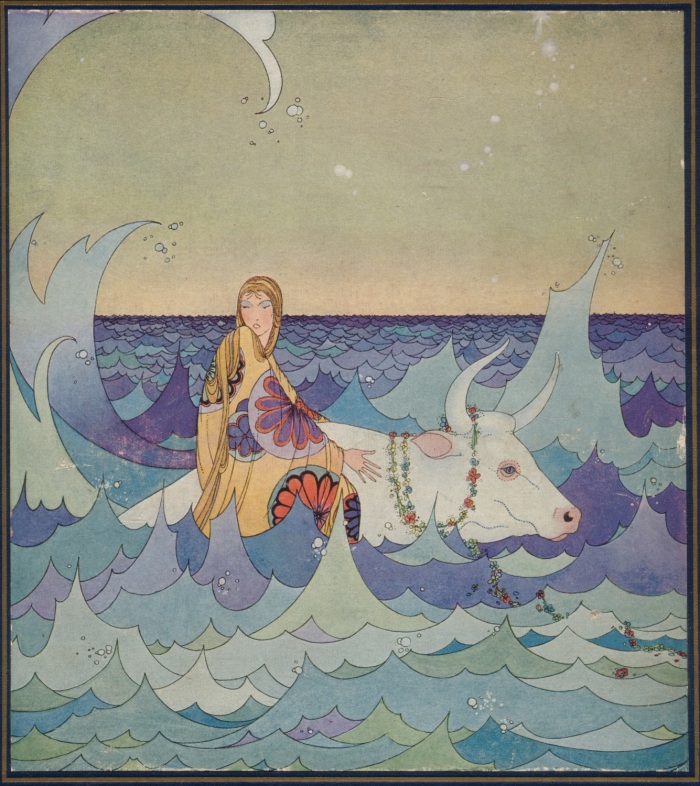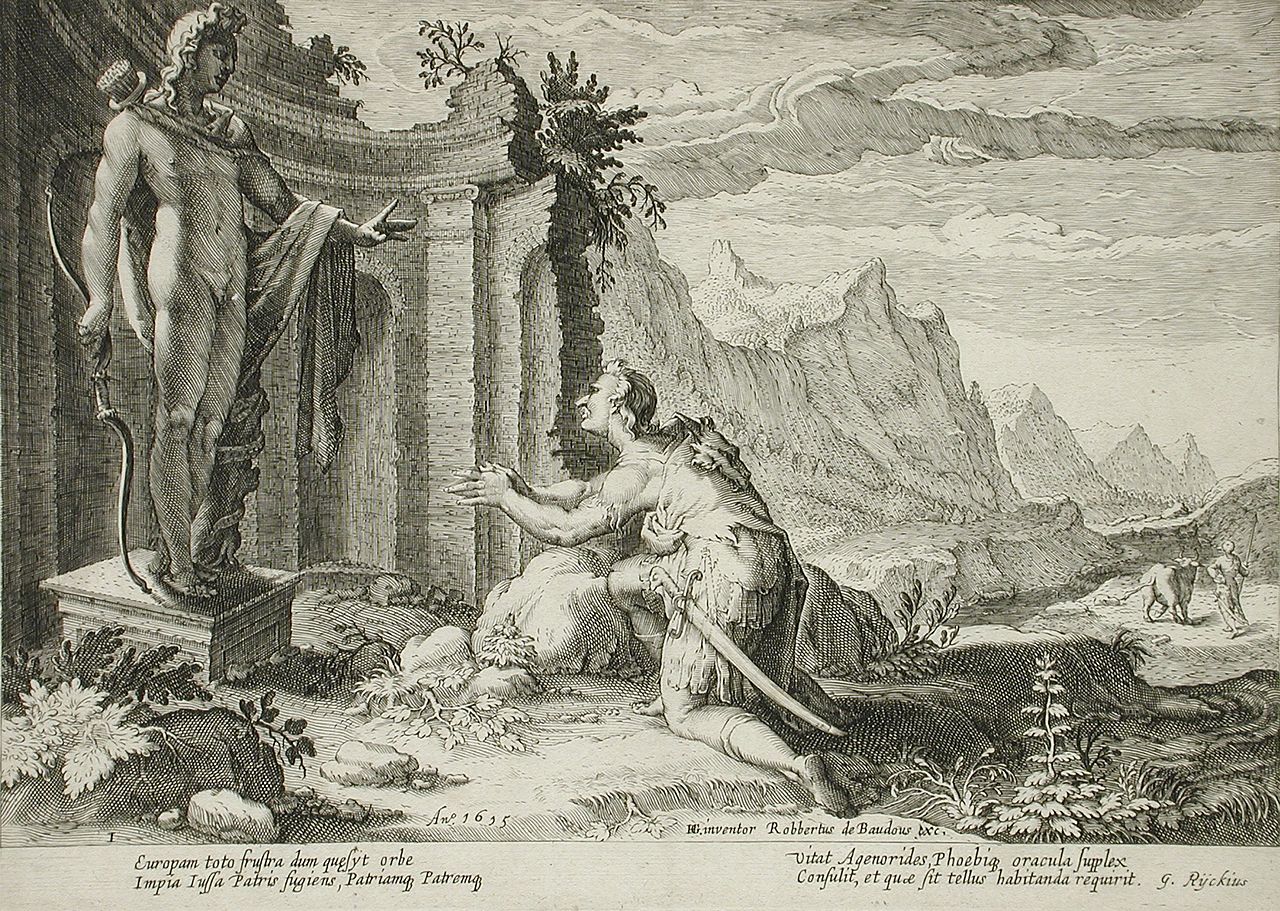Unit 3: Adventure and The Hero’s Journey

Why Cadmus Founded a City
adapted from Favorite Greek Myths by Lilian Stoughton Hyde, $\ccpd$
The Loss of Europa
One day, a girl named Europa was playing in a field by the seashore. She sat on the grass with her lap full of flowers and was weaving the flowers into wreaths for her three big brothers, Cadmus, Phoenix, and Cilix, who were not far away. Suddenly she looked up and saw a snow-white bull, with beautiful silvery horns, standing near her. At first she was afraid, but the bull seemed so gentle and looked at her in such a friendly way, that she lost all fear of it. Taking some clover blossoms from her lap, she ran up to it and held them to its mouth. It ate the flowers and then began skipping around on the grass almost as lightly as a bird. Finally, coming to the place where Europa was weaving together her flowers, it lay down by her side. She petted it and threw some of the wreaths over its horns, then clapped her hands when she saw how pretty they looked. After this, she was climbing up onto its back when it got up and galloped around the meadow with her. Europa, holding on by one of its white horns, laughed, and enjoyed the ride, and did not notice that the bull was taking her farther and farther away from home, and closer to the shore, until it suddenly jumped into the sea and began to swim away with her. Then she was frightened and screamed for her brothers, who heard her and ran down to the shore. But they could not stop the white bull. Europa was carried off and was never seen nor heard from again.

When the three brothers told their father, King Agenor, what had happened, he was quite broken-hearted and furious. He said that his young sister Europa should not have been left alone, and he blamed Cadmus more than the other brothers because Cadmus was the oldest. Finally, he said to Cadmus, ” Go and find Europa and bring her back; or, if you cannot find her, never enter the doors of your father’s palace again.” When the great gates of the city closed behind Cadmus, he started walking toward the west, as that was the direction that the bull had taken. He passed through lonely forests, crossed mountain-chains, and ended up making his way across the sea to other lands, but he could not find Europa nor heard any news of her. Cadmus felt quite sure that the search was useless.
Cadmus and the Dragon

As Cadmus did not dare go home without his sister, he asked the oracle at the shrine of Apollo what he should do. The shrine of Apollo was in a cave at the foot of Mount Parnassus, and the oracle was a mysterious voice that seemed to come from the heart of the mountain. The voice told Cadmus to follow a white cow he would see, and afterward to build a city on the spot where he saw her lie down. After leaving the cave, Cadmus hardly had time to walk down into the road again before he saw a white cow, which he followed, as the voice had told him to do. When the cow came to a certain beautiful valley, she raised her head, as if she were looking up to heaven, and then mooed loudly, after which she lay down, seemingly quite content with the spot. Cadmus knew that this was the place where he must build his city.
Near the spot the cow had chosen was a forest of very old trees, and among the trees, in a rocky place, was a cave. The mouth of the cave was so full of hanging willows that one could not see what it was like inside, but Cadmus thought he could hear water trickling down, and the sound seemed so cool and inviting that he threw a lion’s skin around his shoulders, took his spear, and went into the mouth of the cave.

At first, it was so dark inside that he could see nothing. When his eyes had become accustomed to the change from the bright sunshine he had just left, he saw, in the darkness, two bright spots, and knew that they must be the two eyes of some beast. As he could see better, he discovered the form of a huge dragon with ugly claws. He took up a large stone and launched it straight at the creature’s head, but the scales of the dragon were so hard and tough that the stone rolled away without doing it any harm. Then he threw his spear at it and wounded it with that, but not being much disabled, the creature came out of the cave hissing and attacked him fiercely. As it came nearer, he took his spear once again and pushed it straight into its open mouth, and finally pinned it to a tree which grew there, and so killed it.
As Cadmus stood looking at the dragon, he realized that although he had killed the monster, he was alone in a strange country, where, without help, he would have to build the city ordered by the oracle. Just then he was aware that someone was standing at his side. He looked up and saw a tall, strong-looking woman with clear gray eyes. She had a lance in her hand and a helmet on her head. He knew at once that it was the warrior-goddess, Athena, and as he looked at her he felt his courage coming back. Athena told him to plow the ground nearby and sow the dragon’s teeth. This seemed like strange seeds to plant, but Cadmus did as he was instructed to do, and then stood waiting to see what would happen.

After a short time, the soil began to look a little bumpy in places, as it does when corn is growing, but then instead of blades of corn, sharp steel points began to show. As they came up farther, these looked like spear-points; then helmets appeared all along the rows; finally, fully armed men had grown up out of the earth and stood looking around fiercely, ready to fight. Cadmus thought he had a worse enemy now than the dragon, and made ready to defend himself, but there was no need. For the armed men were hardly out of the soil before they began fighting, one with another, and they fell so fast that soon only five were left. But these last five were wiser than their brothers, for they saw that they gained nothing by killing one another. Instead, they threw their arms on the ground with a crash, and shook hands, to see what would come from helping others. This worked much better. Cadmus shook hands with the rest, and then they all united to build the city on the spot where the cow had laid down. The new city was called Thebes. It was prosperous, and all lived there happily for many years, with Cadmus as king.
adapted from Old Greek Stories by James Baldwin, $\ccpd$
Cadmus was a wise king. The gods who lived with Jupiter among the clouds were well pleased with him and helped him in more ways than one. After a while, he married Harmonia, the beautiful daughter of Mars. All the gods were at the wedding, and Athena gave the bride a wonderful necklace about which you may learn something more at another time.
But the greatest thing that Cadmus did is yet to be told. He was the first scholar of the Greeks and taught them the letters which were used in his own country across the sea. They called the first of these letters alpha and the second beta, and that is why men speak of the alphabet to this day. And when the Greeks had learned the alphabet from Cadmus, they soon began to read and write and to make beautiful and useful books.
As for his dear sister Europa, she was carried safely over the sea to a distant shore, on the island of Crete. She may have been happy in the new, strange land to which she was taken-I cannot tell; but she never heard of friends or home again. Whether it was really Jupiter in the form of a bull that carried her away, nobody knows. Of one thing I am very sure: she was loved so well by all who knew her that the whole continent has been called after her name ever since – Europe.
Comprehension Questions
Answer the following questions according to the reading.
- What happened to Europa at the beginning of the story?
- What is Cadmus’ task?
- According to the oracle of Apollo, what is Cadmus’ task?
- What does Cadmus find in the cave?
- What does Athena tell Cadmus to do?
- What happens when he does what she commanded?
- What are some achievements of Cadmus?
- What do we learn about Europa at the end of the story?
Vocabulary from the Story
“To sow dragon’s teeth” is an idiom in English.
- What does it mean?
- How is it related to the story? (Hint: what happens when the dragon’s teeth are planted?)
- Give an example of a time you sowed dragon’s teeth.
CEFR Level: CEF Level B1


